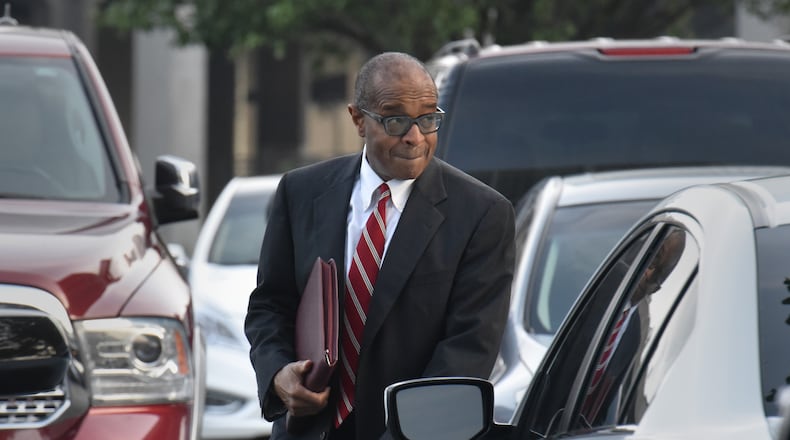Defense attorneys for Pastor Mitzi Bickers dropped a potential bombshell in court late Friday, alleging one of the federal government’s star witnesses in the Atlanta City Hall corruption case was a paid informant for the FBI early on in the alleged cash-for-contracts scheme.
Elvin “E.R.” Mitchell Jr., a former city contractor at the center of the alleged bribery scheme, was paid $50,000 a year by the federal government to try to ensnare public officials to take bribes, defense attorney Drew Findling alleged during a hearing outside the jury’s presence.
Findling alleged Mitchell signed a agreement in 2006 to avoid prosecution amid an unrelated criminal investigation into allegations Mitchell defrauded Fulton County Schools.
Mitchell worked as a paid informant from 2006 to 2012, Findling said. Those years overlap with the time period Mitchell admitted to paying bribes to Bickers for her help in steering city of Atlanta contracts to himself and fellow contractor Charles P. Richards Jr.
Mitchell’s testimony against Bickers is expected to be critical to the government’s case in this first trial of the Atlanta City Hall corruption scandal.
Findling and fellow defense attorney Marissa Goldberg have already tried to lay a foundation that Mitchell is untrustworthy. In her opening statement on Thursday, Goldberg called Mitchell “not credible” and “a hustler and a swindler.”
If evidence that Mitchell was a paid informant tasked with finding government officials to bribe is presented to the jury it could create a pathway for the defense to raise reasonable doubt or potentially an entrapment defense.
“I don’t think this trial can be clean unless the jury knows E.R. Mitchell was employed and cooperating with the government,” Findling said Friday in the hearing, which concerned contested evidence.
In 2006, Mitchell reached a $1.7 million civil settlement with the Fulton schools over alleged overbilling for construction projects at two county schools, according to school system records.
Those alleged acts triggered a federal criminal investigation. Mitchell agreed to become an informant to avoid prosecution at the time, Findling alleged. Mitchell was not charged in the Fulton schools matter and he agreed not to do any government contracting for three years.
Findling said Mitchell’s agreement with the U.S. Attorney’s office and related records were in a mountain of documents provided to defense attorneys as discovery ahead of Bickers’ trial.
But three federal prosecutors in court Friday seemed to know nothing about the alleged agreement.
“If you looked over here, you saw a lot of furrowed brows because we don’t know what (Findling is) talking about,” Assistant U.S. Attorney Nathan Kitchens said. “We’d love to see these records.”
In 2017, the AJC reported Mitchell was approached by federal prosecutors to be an informant and about the existence of an unsigned draft non-prosecution agreement dated from 2006. Federal prosecutors declined to comment to the AJC five years ago if Mitchell had signed an agreement.
On Friday, Findling asked U.S. District Court Judge Steve C. Jones to allow the defense to admit the evidence that Mitchell was a paid informant.
Findling said Mitchell also got the approval of the U.S. Attorney’s Office in 2009, after he was allowed to seek government contracts again, to hire someone to perform public relations work for his firm.
That person, Findling said, was Bickers.
Findling said Mitchell was also heard saying to others at one point that he owed Bickers about $1 million. Such evidence might give the defense another way to establish reasonable doubt from a government case that includes cooperating co-conspirators and substantial bank and tax records.
Jones is expected to make a ruling about the relevancy of the purported documents before Mitchell testifies, which could be early next week.


